In the hershey c - Study guides, Class notes & Summaries
Looking for the best study guides, study notes and summaries about In the hershey c? On this page you'll find 221 study documents about In the hershey c.
Page 4 out of 221 results
Sort by
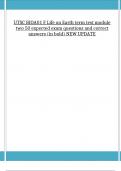
-
UTSC BIOA01 Life on Earth term test module two |50 expected exam questions and correct answers (in bold) |NEW UPDATE
- Exam (elaborations) • 11 pages • 2024
-
- $12.99
- + learn more
UTSC BIOA01 Life on Earth term test module two |50 expected exam questions and correct answers (in bold) |NEW UPDATE UTSC BIOA01 F Life on Earth term test module two 50 expected exam questions and correct answers (in bold) NEW UPDATE chapter nine 1. during the cell cycle, the dna mass of a cell a. decreases during g1 phase b. decreases during metaphase c. increases during the s phase d. increases during g2 phase e. decreases during interphase 2. honeybee eggs that are not fertili...
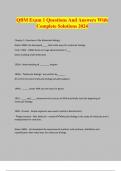
-
QBM Exam 1 Questions And Answers With Complete Solutions 2024
- Exam (elaborations) • 77 pages • 2024
- Available in package deal
-
- $15.49
- + learn more
QBM Exam 1 Questions And Answers With Complete Solutions 2024 Chapter 1: Overview of the Molecular Biology Geber 1800s: He developed ____ that make ways for molecular biology. From 1700s - 1900s there are huge advancements in ___ (start studying small molecules) 1930s- Understanding of ________ happen 1938s - "Molecular Biology" was written by ______. (First time the word molecular biology actually happen) 1944s - _____ shows DNA was the basis for genes 1953 - ____ and ____ determine...
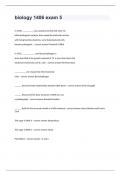
-
biology 1406 exam 5 questions n answers latest update
- Exam (elaborations) • 5 pages • 2024
- Available in package deal
-
- $11.49
- + learn more
biology 1406 exam 5 questions n answers latest updateIn 1928, __________ was surprised to find that when he killed pathogenic bacteria, then mixed the bacterial remains with living harmless bacteria, some living bacterial cells became pathogenic. - correct answer Frederick Griffith In 1952, ___________ used bacteriophages to show that DNA is the genetic material of T2, a virus that infects the bacterium Escherichia coli (E. coli). - correct answer Hershey-Chase __________ are viruses ...
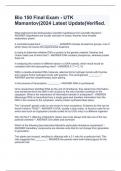
-
Bio 150 Final Exam - UTK Mamantov(2024 Latest Update)Verified.
- Exam (elaborations) • 19 pages • 2024
- Available in package deal
-
- $14.99
- + learn more
What statement best distinguishes scientific hypotheses from scientific theories? - ANSWER Hypotheses are usually narrower in scope; theories have broader explanatory power. A controlled experiment ____________. - ANSWER includes at least two groups, one of which does not receive the experimental treatment In trying to determine whether DNA or protein is the genetic material, Hershey and Chase made use of which fact? - ANSWER DNA contains phosphorus, whereas protein does not. In analyzi...
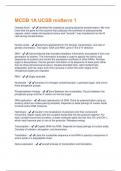
-
MCDB 1A UCSB midterm 1 Questions and Answers New (2025/2026) Solved 100% Correct
- Exam (elaborations) • 12 pages • 2024
- Available in package deal
-
- $7.99
- + learn more
Oswald Avery - ️️Identified the substance causing bacterial transformation. We now know that the gene for the enzyme that catalyzes the synthesis of polysaccharide capsule, which makes the bacterial colony look "smooth," was transferred into the R cells during transformation. Nucleic acids - ️️polymers specialized for the storage, transmission, and use of genetic information. Two types- DNA and RNA. grow in the 3'-5' direction DNA - ️️macromolecule that encodes here...
![Chapter 13 Life 120 [2024] Exam 3 UNL (A+ Graded)](/docpics/3746881/6542db148a757_3746881_121_171.jpeg)
-
Chapter 13 Life 120 [2024] Exam 3 UNL (A+ Graded)
- Exam (elaborations) • 12 pages • 2023
-
- $11.61
- + learn more
1) In his transformation experiments, what did Griffith observe? A) Mutant mice were resistant to bacterial infections. B) Mixing a heat-killed pathogenic strain of bacteria with a living nonpathogenic strain can convert some of the living cells into the pathogenic form. C) Mixing a heat-killed nonpathogenic strain of bacteria with a living pathogenic strain makes the pathogenic strain nonpathogenic. D) Infecting mice with nonpathogenic strains of bacteria makes them resistant to pathogeni...
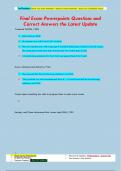
-
Final Exam Powerpoints Questions and Correct Answers the Latest Update
- Exam (elaborations) • 24 pages • 2024
-
- $12.49
- + learn more
Frederick Griffith, 1928 didnt discover DNA. He injected mice with R and S (S=virulent). Then. He injected mice with living type R and heat-killed type S bacteria into the mouse. The living type R cells have been transformed inti virulent type S cells! A transforming substance for the S trait was passed feom S to R cells. Avery, MacLeod and McCarty, 1944 They showed that the transforming substance was DNA. -They purified any cells transddormed from R--->S and found that the tr...
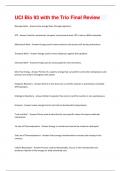
-
UCI Bio 93 with the Trio Final Review Questions With 100% Correct Solutions.
- Exam (elaborations) • 23 pages • 2024
- Available in package deal
-
- $7.99
- + learn more
Bioengernetics - Answer-How energy flows through organisms. ATP - Answer-Used for mechanical, transport, and chemical work. ATP is also an RNA nucleotide. Mechanical Work - Answer-Energy used in motor proteins and muscle cells during contractions. Transport Work - Answer-Energy used to move substances against their gradient. Chemical Work - Answer-Energy used to convey polymers into monomers. Gibs Free Energy - Answer-Portion of a systems energy that can preform work when temperature and p...
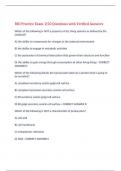
-
BIO Practice Exam 1|50 Questions with Verified Answers,100% CORRECT
- Exam (elaborations) • 16 pages • 2024
-
- $10.99
- + learn more
BIO Practice Exam 1|50 Questions with Verified Answers Which of the following is NOT a property of ALL living systems as defined by the textbook? A) the ability to compensate for changes in the external environment B) the ability to engage in metabolic activities C) the possession of chemical instructions that govern their structure and function D) the ability to gain energy through consumption of other living things - CORRECT ANSWER D Which of the following details the typica...
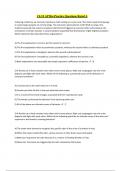
-
Ch 51 AP Bio Practice Questions Rated A
- Exam (elaborations) • 23 pages • 2024
- Available in package deal
-
- $9.49
- + learn more
Ch 51 AP Bio Practice Questions Rated A 1) During a field trip, an instructor touched a moth resting on a tree trunk. The moth raised its forewings to reveal large eyespots on its hind wings. The instructor asked why the moth lifted its wings. One student answered that sensory receptors had fired and triggered a neuronal reflex culminating in the contraction of certain muscles. A second student responded that the behavior might frighten predators. Which statement best describes these e...

Do you wonder why so many students wear nice clothes, have money to spare and enjoy tons of free time? Well, they sell on Stuvia! Imagine your study notes being downloaded a dozen times for $15 each. Every. Single. Day. Discover all about earning on Stuvia


